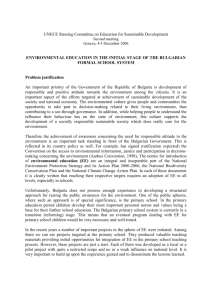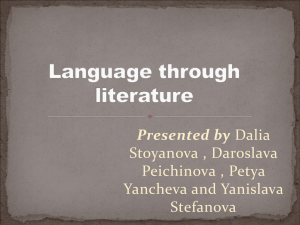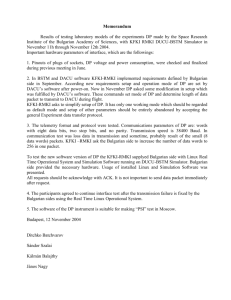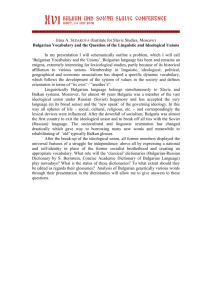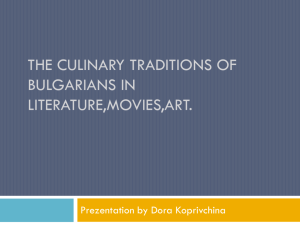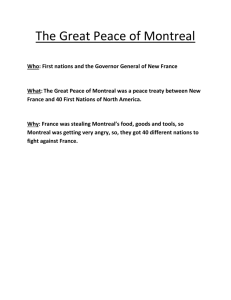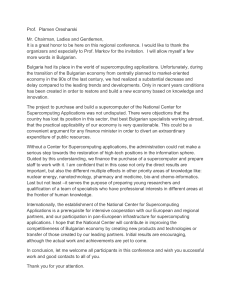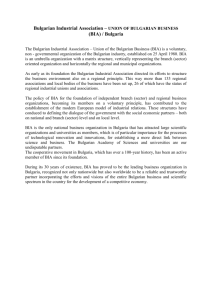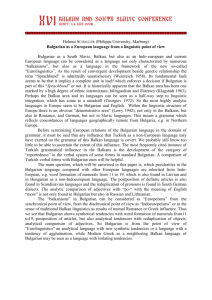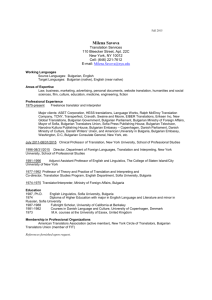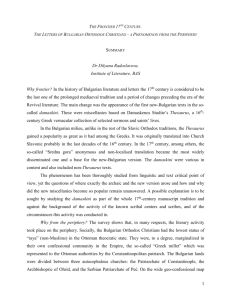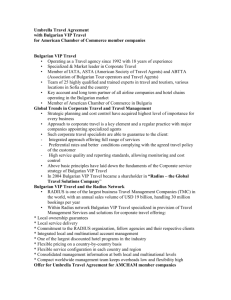“I am a Bulgarian proud of my country, its history and culture
advertisement
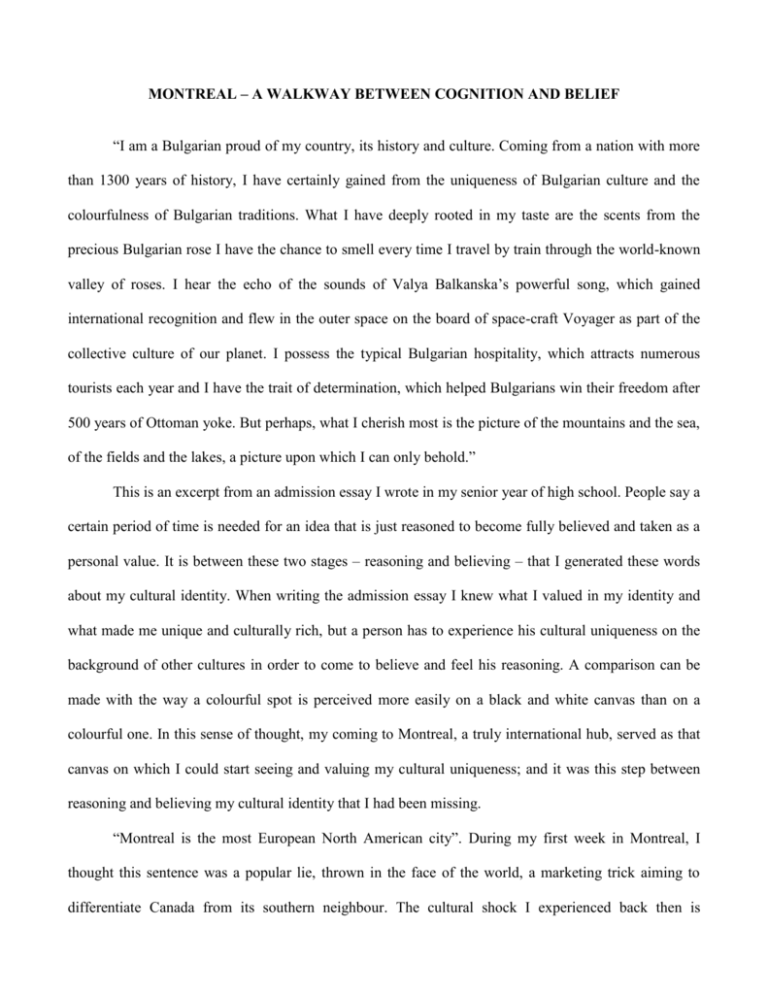
MONTREAL – A WALKWAY BETWEEN COGNITION AND BELIEF “I am a Bulgarian proud of my country, its history and culture. Coming from a nation with more than 1300 years of history, I have certainly gained from the uniqueness of Bulgarian culture and the colourfulness of Bulgarian traditions. What I have deeply rooted in my taste are the scents from the precious Bulgarian rose I have the chance to smell every time I travel by train through the world-known valley of roses. I hear the echo of the sounds of Valya Balkanska’s powerful song, which gained international recognition and flew in the outer space on the board of space-craft Voyager as part of the collective culture of our planet. I possess the typical Bulgarian hospitality, which attracts numerous tourists each year and I have the trait of determination, which helped Bulgarians win their freedom after 500 years of Ottoman yoke. But perhaps, what I cherish most is the picture of the mountains and the sea, of the fields and the lakes, a picture upon which I can only behold.” This is an excerpt from an admission essay I wrote in my senior year of high school. People say a certain period of time is needed for an idea that is just reasoned to become fully believed and taken as a personal value. It is between these two stages – reasoning and believing – that I generated these words about my cultural identity. When writing the admission essay I knew what I valued in my identity and what made me unique and culturally rich, but a person has to experience his cultural uniqueness on the background of other cultures in order to come to believe and feel his reasoning. A comparison can be made with the way a colourful spot is perceived more easily on a black and white canvas than on a colourful one. In this sense of thought, my coming to Montreal, a truly international hub, served as that canvas on which I could start seeing and valuing my cultural uniqueness; and it was this step between reasoning and believing my cultural identity that I had been missing. “Montreal is the most European North American city”. During my first week in Montreal, I thought this sentence was a popular lie, thrown in the face of the world, a marketing trick aiming to differentiate Canada from its southern neighbour. The cultural shock I experienced back then is inexplicable today. Everything was different from what I had been used to - the way people walked, talked, dressed, communicated with each other, the values they possessed, the type and quantity of the goods they bought, and the way they used these goods. I had traveled a lot around the world before that but I had never faced such an issue, probably because I had been only a tourist. Now, all the small things mattered, and all these small things made me feel different and alienated. Soon, I started realizing how European I was, something I had not really pondered over. And I started naming myself European. After a while though, I met other Europeans, as Montreal hosts a wide array of cultures and nationalities. And as I communicated with those Europeans, I understood I was not only a European, I was something else. In most western Europeans I could not find that same soul, that same softness of character, openness for other cultures and humaneness that I eventually figured out were the hallmarks of Eastern Europe. By interacting even more with other people, I figured out there was something more in me than just an Eastern European. Above all, I was Bulgarian, and no one can describe how I manage to link to those individuals alike me, how I manage to notice who is Bulgarian and who is not. I guess it is once again the small things that play their role. And it was not the Bulgarian rose, or Valya Balkanska’s song anymore that made me proud of being Bulgarian. Actually, there was no need for pride anymore, as I could just preserve the name Bulgarian for myself, a name with which I now translate my character and my soul. My room in Montreal – a mouse’s hole, hidden in the basement of a mediocre building right next to the splendid Trottier Building; a cell in which sunlight could hardly get in due to its low elevation and illogical proximity to a gigantic frat house. One would normally feel forgotten and lonely in such a room, no matter how many things one can place inside, if it were not the roommate there, sharing with you that same feeling. He was a Turkish boy who, just like me, felt the cultural shock and the feeling of being different. But my coexistence with him revealed to me yet another important perspective of my identity. Born and raised in a Christian country, I had never lived with a Muslim in my life before. Hence, my life with my Muslim roommate turned into an entire new experience for me. The differences became noticeable soon: “I bought meat for tonight’s dinner.” - “I don’t eat pork,” was his immediate reply. “What present are you going to give your parents for Christmas?” – “I don’t celebrate Christmas!” My whole world of pretty traditions and customs was shattered into pieces. I now was forced to understand that all the crosses and icons I have, all the holidays I celebrate and most of the meals I eat, are unique for me and for perhaps only another good half of humanity. But the other half simply neither has these crosses and icons nor celebrates these holidays. How arrogant and discriminative had I been before? No! When you are raised with certain traditions and when everything around you up to that moment has revolved around these traditions, you soak into this world order to such an extent that your only touch with life outside that order becomes the history classes of Islam, Buddhism and Hinduism. Yes, I was Christian, a fact I had not really believed, but only reasoned. And soon, I noticed I was not only a Christian. Among the great variety of Christians, I found out I was classified as Orthodox – again, differing me from the rest of the Christian denominations. But in the end, at least I started believing there was something called Orthodoxy that made me special in yet another way. Until I reached the conclusion I was just an Orthodox Bulgarian, I had inevitably discriminated all other people who were so different from me, who were not called Europeans, Eastern Europeans, Bulgarians, Christians or Orthodox. But I found out who I actually am. Therefore, this quest to selfidentification helped me understand others as well, no matter how different they were or how alien they had once seemed to me. And as time passed I came to understand Montreal is not just a North American city, neither is it European. It is truly a city of the world, a city I now value and love highly, for it gave me a chance to realize my cultural identity and at the same time to learn how to cohabit with a whole variety of different people. -------- Tzvetan Naydenov
